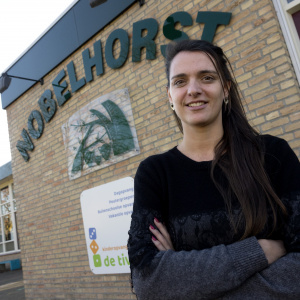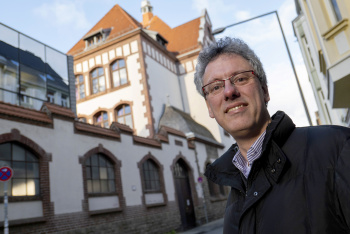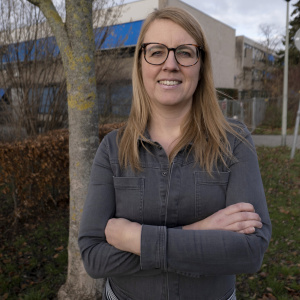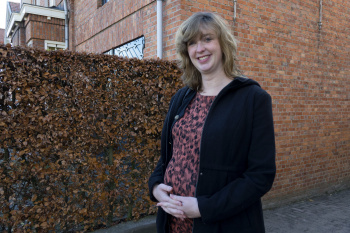Crossing the border to stand in front of the class
Every day they drive across the border to stand in front of the class. Why? And how different is that? Four frontier workers talk about their motives. "Here I can make a difference."

Image: Pixabay
Latoya Vannerum (32) from Melsele, Belgium, is a teacher at Nobelhorst Primary School in Hulst, Zeeland.

Latoya Vannerum works at a school in Hulst.
After nine years in Belgian primary education, Latoya Vannerum was fed up. “If you teach at the same school in Belgium for three years, you get a permanent appointment. That gives a lot of security, because then you will continue to be paid, even if they cannot find a school for you. Time and again I ended up at a different school, so that permanent appointment was always canceled. ”
When there was also shrinkage in the schools in the vicinity of Antwerp and the surrounding area, which made the situation even more dire, Vannerum decided to choose eggs for her money. “I heard from a friend that there was a teacher shortage in the Netherlands and that salaries were a bit higher. Zeeuws-Vlaanderen is very easy to do from my hometown Melsele, a village west of Antwerp. ”
Vannerum took the plunge and applied last spring for a job as a grade 3 teacher at Nobelhorst primary school in Hulst, 17 kilometers from Melsele. Vannerum does not see very big differences between primary education in Belgium and the Netherlands. Or it must be that children already go to school there at the age of 2,5 and that nursery education is a lot less school than in the Netherlands.
I see my future here now
“What is also striking is that the students and parents all speak Dutch well. In Antwerp I had a lot of refugee children in my class with parents who hardly spoke a word of Dutch, which was sometimes difficult. ” But even now there are language differences, right? Vannerum laughs. “Yes, a mother recently told me that her child did not understand what I meant by sticking on a craft assignment. 'Then I just pasted it on', she had said to her mother. ”
Vannerum has an annual contract in Hulst, but hopes that she will be able to stay after this year. Her diploma has since been recognized in the Netherlands. “That was arranged very quickly. I now see my future here in the Netherlands, but will continue to live in Belgium. I get to work faster than when I still had to go to Antwerp, with all those traffic jams. ”
Freek van den Brink (52) from Vaals has been working at an MBO in Aachen for almost ten years, teaching Dutch and social studies.

Freek van den Brink works in Aachen, Germany. (Image: Rob Niemantsverdriet)
Freek van den Brink worked as an interpreter-translator German in Vaals and as a part-time teacher for ITV Hogeschool in Utrecht when he was asked in 2009 to teach Dutch at the Paul-Julius-Reuter-Berufskollege, an MBO in Aachen, Germany. "I had already been carefully introduced to education at ITV and I liked it very much, so the step was taken quickly." In the beginning, Van den Brink had to get used to the grading system in Germany. “Except that a 1 is the highest number there and a 6 the lowest, the way in which the number is calculated is completely different. The behavior and involvement of students in the lesson determine half the grade. You really have to develop your fingerspitzengefühl for that. ”
Van den Brink does not see cultural differences that way, unless it is the case that it is more formal and more distant between colleagues. “But that is not meant to be unfriendly anyway. It's just a bit more polite. It is also a bit more bureaucratic, to get something done you often have to fill in a form. ”
The final mark is very decisive in Germany
The salary differences in Germany are quite large. “That has to do with whether you Civil servant are, or employee. That depends on your previous education and experience. If Civil servant you earn more and you have better pension provisions. That can save a few hundred euros per month on your wages and even a ton on your pension, over a whole working life. ”
Van den Brink has now been working in Germany for almost ten years, now also as a social studies teacher. He combines his work abroad with a job as a German teacher at the Hogeschool Zuyd in Maastricht. Still, he wouldn't quit his job in Germany so quickly. “You learn so much more from society when you are part of it yourself. And that also applies to my command of the German language. ”
Classical languages teacher Josefien Ruts (38) from Lanaken, Belgium, had to look for a new job urgently and found one in Maastricht.

Josefien Ruts works at a school in Maastricht and teaches classical languages. She lives in Belgium. (Image: Rob Niemantsverdriet)
Josefien Ruts was working as a Latin teacher at a secondary school in Maasmechelen in 2008 when she heard on the last day before the school holidays that her contract would not be renewed. “I then started googling like crazy looking for a new job. My husband and I desperately needed my income, because we had just bought a house with a high mortgage. ” She saw a vacancy for a teacher of classical languages at the gymnasium of the Porta Mosana College in Maastricht. “I remember my job interview very well. For an hour they listened to me about my vision on education and I was presented with all kinds of cases. That was a real shock, because in Belgium such a procedure is no more than a five-minute conversation. ”
My children are free when I have to work
After that interview, she was informed that she had been hired and was allowed to negotiate her salary with HR. "I could not believe my ears. In Belgium your salary is based on your previous education and the number of days you have worked in the profession. You don't have that whole Dutch mix of functions there. ”
In ten years, Ruts has become quite Dutch in the field of education. “In Belgium, education is more traditional, the teacher talks and the students write everything down. Here there is much more interaction and more often project-based work. To be honest, that suits me better than the Belgian style. ”
From her hometown Lanaken, Ruts drives to work in Maastricht in twenty minutes. “That can hardly be called a disadvantage. The fact that the school holidays do not coincide is very difficult. I have three young children. They are free when I have to work and vice versa. Colleagues often talk about long May holidays and I would get up every morning at seven to take my children to school. ”
Alexandra de Waele (30) drives daily from her hometown Hulst to Antwerp for her job at primary school De Luchtballon.

Alexandra de Waele from Zeeuws-Vlaanderen drives daily to Antwerp. (Image: Rob Niemantsverdriet)
"No, my family has lived in the Netherlands for generations, but my surname does indeed sound Flemish." That surname has come in handy in recent years, because De Waele works in Antwerp. After her teacher training in Vlissingen, she did some raid work when, in the autumn of 2011, she came into contact with the public institution Stedelijk Onderwijs Antwerp with 172 locations. “The principal of a primary school asked me to fill in for two weeks. I did that and one thing led to another. In the end I stuck and I have had a permanent appointment for two and a half years. ”
After that break-in period, I lingered
De Waele works at a school with predominantly children with a non-Western background. “But that is precisely the reason that I work here and not somewhere in Zeeuws-Vlaanderen. Here I can make a difference in the lives of the children, although it is sometimes difficult because they experience all kinds of things at home. The first years I took that home, but now I can let it go better. Yet I can see from the failure around me that not everyone succeeds. We are even four teachers short this school year. ”
De Waele would rather not think back to the period when she had to have her diploma recognized. “That took months. And the worst part was that I didn't get paid until it was arranged. That's why I worked in a bakery in Hulst to have a little income. ”
According to De Waele, salaries are also somewhat lower than in the Netherlands. "I am now at about 1850 euros net, in the Netherlands I would already earn more than 2000 euros, I think." However, she will not be going back to work in the Netherlands very soon, as she is completely integrated in Belgium. Well, not quite, she thinks. "In Belgium it is very common to say that children should sit on their poo, but I really can't get those words out."


